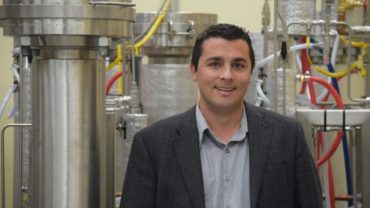Two of Santa Rosa’s top priorities — building new housing and legalizing cannabis businesses — are colliding in a simmering land-use dispute that could affect future development around the city’s new downtown SMART rail station.
A company planning to grow medical cannabis in an industrial building near downtown is getting pushback from housing developers who claim the project threatens the city’s long-term plans to build high-density housing near the Railroad Square station.
It’s the latest example of how state legalization efforts and the city’s welcoming posture toward the cannabis industry is triggering a “green rush” of investment likely to transform the city’s economy and neighborhoods for years to come.
“Cannabis, in some ways, has changed the industrial and light industrial landscape,” city planner Andy Gustavson said. “We’re kind of in this interesting moment. Can industrial uses continue to be complementary to, or will they frustrate the development of, residential uses?”
Developer Rick Deringer has some pretty strong opinions on that subject. He’s is trying to build a 185-unit apartment project about 1,000 feet away from a proposed cannabis cultivation project on Maxwell Court. He thinks allowing cannabis businesses into the area is an abysmal idea and contrary to the city’s plans to transition the industrial area to residential uses over time.
“It is impossible for housing to be built in an area with cannabis uses,” Deringer wrote to the city, citing what he sees as a variety of nuisance, safety, environmental and economic issues.
Deringer’s DeTurk Winery Village project recently won council approval but has yet to apply for building permits. The project, which Deringer has pursued for 13 years, aims to transform a former winery warehouse complex four blocks north of the station into one of the larger apartment developments in the city.
But Deringer thinks cannabis businesses are simply incompatible with housing projects like his, and he’s asking the City Council to step in.
The Planning Commission, on a 4-1 vote in February, approved plans by Fleuron, Inc., to build a 10,962-square-foot cannabis cultivation and processing operation at 60 Maxwell Court. Deringer appealed that decision and the City Council must decide the issue Tuesday.
Fleuron is a partnership between Brandon Levine, director of Cotati dispensary Mercy Wellness, and Aron Milhaly, who grows cannabis at an undisclosed location for Mercy Wellness. The friends say the property, which once housed a sign fabrication company, is a perfect location for indoor cannabis cultivation.
It is removed from residential areas, surrounded by other industrial uses, and in a building that is easy to fully secure. They say the building will also be outfitted with the latest and most efficient water, power and odor-control systems available.
“We’re going to remain as low-impact on the community as possible,” Levine said.
The pair, who’ve known each other for about 15 years, even chose a company name unlikely to give anyone a sense of what kind of company it is. A fleuron, from the French word for flower, is a stylized flower-like ornament.
Levine, who has operated Mercy Wellness for seven years, knew they might get some opposition over the location but said there aren’t many viable cannabis cultivation sites in the city, which for now are restricted to industrial areas.
Fifteen other potential operators were looking at the site and the landlord hired a consultant to vet them before picking Fleuron, Levine said. The company plans to invest at least $2 million in the building and operate in the space long-term, he said.
Deringer is not the only one opposed to the project. Across the rail line from the DeTurk warehouse is a narrow property where Loren Brueggemann has approval to begin construction on a 72-unit apartment complex called Pullman Lofts.
“This project is a $25 million project,” Brueggemann told the Planning Commission. “My investors are extremely nervous.”
And neighboring businesses who’ve seen their rents rise aren’t excited about the idea, either.
Dan Fraley, owner of auto repair business the Rear End Shop just east of the building Fleuron is leasing, said he saw a 15 percent rent increase recently that he attributes in part to cannabis operators.
He said he worries about additional increases and possible security issues.
“I’m not real thrilled,” Fraley said.
Fleuron’s consultant, Craig Litwin, stressed that there will be no public access to the property, only for employees through electronic controlled gates, no money held on the property, two security guards on site during business hours and numerous security cameras.
“We’re in line with the vision of the city,” Litwin said. “We’re following the rules.”
The city does want the area to become residential someday, Litwin agreed, but wisely chose not to place so many restrictions on the industrial uses that the area will just “limp along.”
“It doesn’t make sense to constrain it to the point where the area becomes inactive,” Litwin said.
The city passed the downtown station area plan in 2007 to encourage denser housing uses around the station, enacting another one around the Coddingtown station in 2012.
In 2010, a zoning change was passed for the Maxwell Court area specifically to create a “limited light industrial combining district” that effectively made it clear the industrial uses were legal for now, as opposed to “legal non-conforming,” which is more restrictive, Gustavson explained.
The city code reads that zoning “is intended to allow those industrial uses to continue until the area is ready to convert to mixed-use residential and neighborhood retail.”
That provision has confused and troubled some West End residents who want to see industrial uses, like the BoDean asphalt plant, phased out more quickly or held to tougher regulatory standards.
Allen Thomas, a land-use consultant working for Brueggemann and a persistent critic of BoDean, predicted that the approval of Fleuron will just encourage more cannabis uses, which will make it less likely housing will flourish there.
“The floodgates will open the Maxwell Court area to the cannabis business if the city grants this request,” Thomas predicted.
You can reach Staff Writer Kevin McCallum at 707-521-5207 or kevin.mccallum@pressdemocrat.com. On Twitter @srcitybeat.










